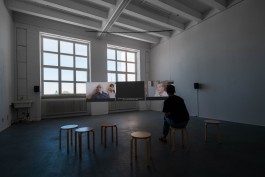
Glück auf / Good luck
2018, HD video, color, sound, 26:38 min, 3-channel video installation
Two years of research and production process in Japan and Germany lead to a documentary three-channel installation "Glück auf" from 2018. My grandfather got me interested in coal mining because he worked as a miner in Japan.
I learned that a total of 436 Japanese miners worked as guest workers in the Ruhr area between 1957 and 1965. There was a strange misunderstanding about the word "guest worker". In the 1960s, the translator at the time did not use the term "guest worker" in the sense of foreign workers who came to work in Germany, but rather "guest worker". Many miners thought they were invited to give lectures in Germany. After a while underground, they realized that they were not guests.
The duration of the program was three years. All miners were supposed to return to Japan in full. There were only three ways to be allowed to stay in Germany: 1. to obtain student status, 2. to find employment in a Japanese company and 3. to marry a German woman. The length of the residence permit depended on the justified status. Today there are still exactly the same three options. A total of 32 Japanese miners have remained in Germany, most of them are still living here.
I filmed interviews with two former miners. One stayed in Germany after the guest worker period, the other returned to Japan. Their stories sound like my imminent future. I have to decide whether to return to Japan or stay in Germany. I've been asking myself this question ever since I've lived in Germany, and it comes up again and again. It affects all foreigners who want to live in another country. In the film there are four different perspectives from different generations, whose past, present and future mirror each other.






Production and Post-Production | Fumiko Kikuchi
Translate:
Japanese > English | Erika-Shanti Morsbach
English > German | Meike Redeker
Correction of spelling | Jana Doell
Thanks to: Mr. Doi, Mr. Kobayashi, Takafumi Murata, Akane Sugimoto, One-Seok Choi

Glück auf / Good luck
2018, HD video, color, sound, 26:38 min, 3-channel video installation
Two years of research and production process in Japan and Germany lead to a documentary three-channel installation "Glück auf" from 2018. My grandfather got me interested in coal mining because he worked as a miner in Japan.
I learned that a total of 436 Japanese miners worked as guest workers in the Ruhr area between 1957 and 1965. There was a strange misunderstanding about the word "guest worker". In the 1960s, the translator at the time did not use the term "guest worker" in the sense of foreign workers who came to work in Germany, but rather "guest worker". Many miners thought they were invited to give lectures in Germany. After a while underground, they realized that they were not guests.
The duration of the program was three years. All miners were supposed to return to Japan in full. There were only three ways to be allowed to stay in Germany: 1. to obtain student status, 2. to find employment in a Japanese company and 3. to marry a German woman. The length of the residence permit depended on the justified status. Today there are still exactly the same three options. A total of 32 Japanese miners have remained in Germany, most of them are still living here.
I filmed interviews with two former miners. One stayed in Germany after the guest worker period, the other returned to Japan. Their stories sound like my imminent future. I have to decide whether to return to Japan or stay in Germany. I've been asking myself this question ever since I've lived in Germany, and it comes up again and again. It affects all foreigners who want to live in another country. In the film there are four different perspectives from different generations, whose past, present and future mirror each other.






Production and Post-Production | Fumiko Kikuchi
Translate:
Japanese > English | Erika-Shanti Morsbach
English > German | Meike Redeker
Correction of spelling | Jana Doell
Thanks to: Mr. Doi, Mr. Kobayashi, Takafumi Murata, Akane Sugimoto, One-Seok Choi